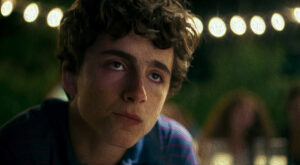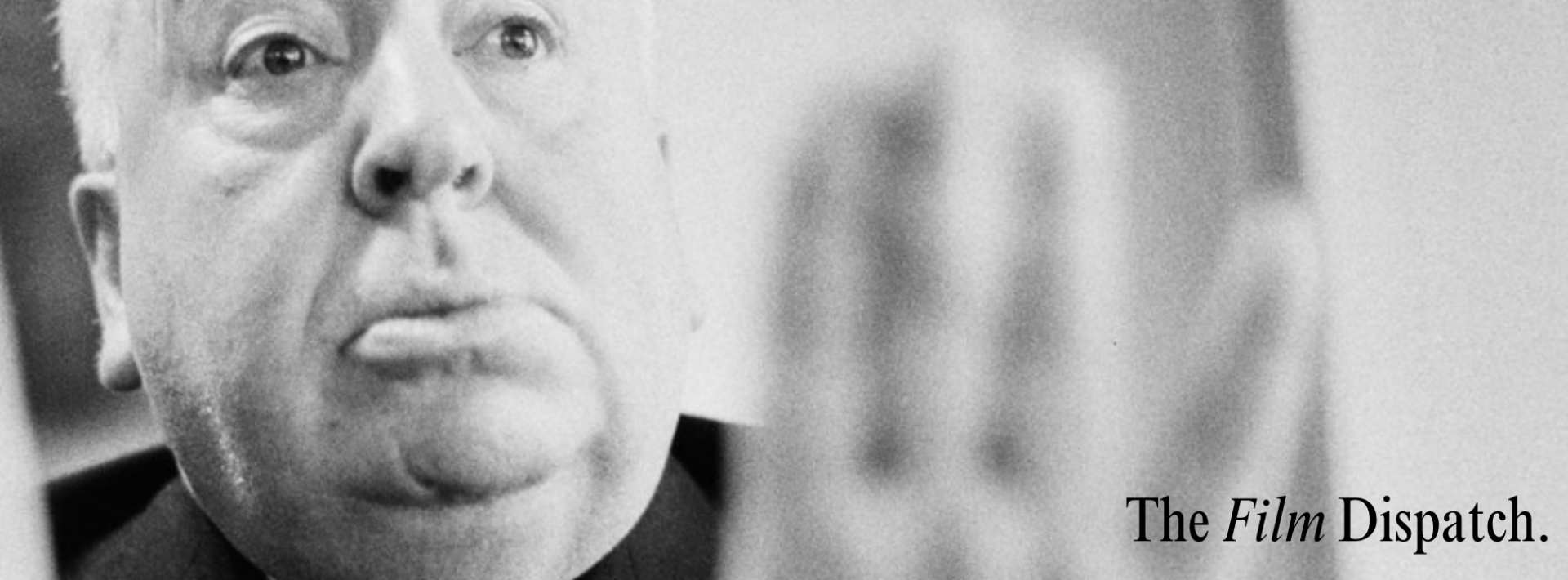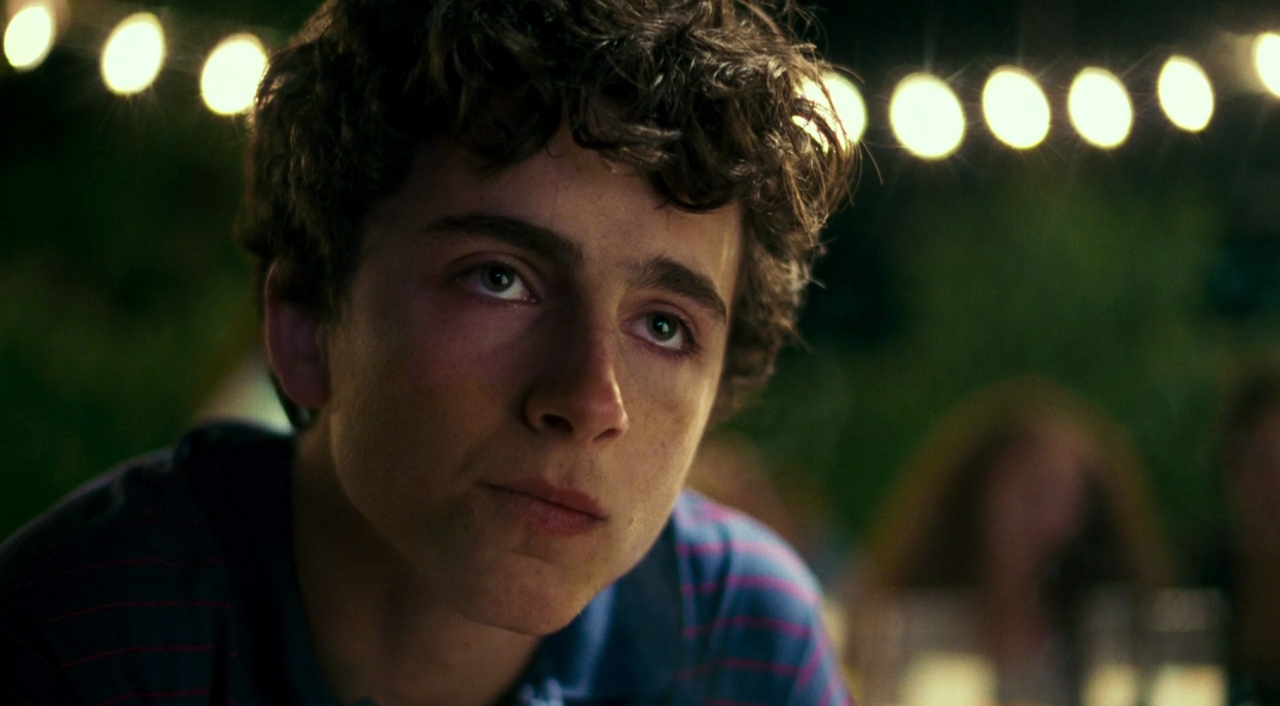Our previous issue – The Gaze – was about the act of looking and many of our contributors turned to Celine Sciamma’s Portrait of a Lady on Fire. While reading their pieces, I was reminded of another successful queer film: Call Me By Your Name (2017, dir. Luca Guadagnino). The film follows Elio (Timothee Chalamet) as, over the course of a summer, he falls in love with Oliver (Armie Hammer) and wrestles with whether to admit this love.

Watching Oliver
The credits are overlaid with printed photographs of statues – naked and mostly male. When the film proper begins, we open on Elio in his room, shirtless. Both the audience and Marzia (Esther Garrel) watch as Elio puts on a shirt. Then, following Elio and Marzia’s lead, the camera watches Oliver arrive at the villa. From the opening frames, then, the film teaches the audience to look; not just getting us accustomed to seeing the characters semi-naked (there are countless shots of both Timothee Chalamet and Armie Hammer shirtless throughout the film) but also, observing the characters.
The camera’s movements seem to imitate the gaze of a voyeur. The camera moves seamlessly yet the film seems to be devoid of crane and dolly shots. In short, the camera makes no movements that a human eye could not. But, we are not alone in this voyeurism.
From the opening scene onwards, Elio watches Oliver. Elio watches Oliver arrive at the villa and then seems to spend every other scene watching Oliver. At a certain point, it feels as if the whole film is us watching Elio watch Oliver. The most engaging example of this is the dance scene where Oliver dances while Elio and his friends sit at a table watching.
Though Elio’s friends are also watching and desiring, with Elio in the foreground closest to the camera, our attention is on him and his experience of watching Oliver. When one of the friends – referring to the woman Oliver is dancing with – says: ‘Who wouldn’t love to be in her shoes?’ the camera abruptly cuts to Elio. The shot changes to an extreme close-up with only Elio in the frame, watching Oliver and smoking a cigarette. The sense of longing is palpable. The look on Chalamet’s face is so striking that it becomes one of the most memorable frames of the film. Elio, clearly desires Oliver but is trapped in desire, unable to speak, like the young knight that his mother reads about: ‘Is it better to speak or to die?’
The soundtrack, too, communicates this paralysing desire. The song that plays – Lady, Lady, Lady from Flashdance – refers to a man encouraging a woman to confess her love to him. The lyrics open with: ‘frightened by a dream, you’re not the only one/ Runnin’ like the wind, thoughts can come undone/ Dancin’ behind masks, just sorta pantomime/ But images reveal whatever lonely hearts can hide/’. In these lyrics, we can see the tension not only between Elio and Oliver but within Elio as he decides whether to act on this dream that frightens him; the desire that he cannot hide from the camera.
The song changes and, emboldened, Elio gets up to dance. Now, Love My Way by The Psychedelic Furs plays – the last line of the song tells us: ‘You can never win or lose if you don’t run the race.’ In the end, Elio has chosen to speak; but not through words, through his actions, through his gaze.
Scenes later, Elio shows Oliver his favourite spot by the river. Standing in the water facing each other, Elio steps closer to Oliver, holding his gaze. His feelings are communicated in that look and it is to that look that Oliver replies: ‘You make things difficult for me.’
Watching Elio
Since Elio does most of the looking and his gaze is a desiring one, it might be tempting to label this the infamous ‘male gaze’ that objectifies the female, or feminized, object. Yet the film goes to lengths to counteract this. The casting of Armie Hammer – a particularly buff matinee idol – as the supposed object undermines this. He is simply too broad-shouldered, too archetypally masculine to bear our gaze in this binary way.
This seems to place Elio in the more stereotypically ‘feminine’ position. Much has been made of Timothee Chalamet’s ‘look’ and director Greta Gerwig commented on his androgyny as a motivator for casting him as Laurie in her Little Women adaptation.
But this gaze is not as reductive as male-subject gazes at female-object because Oliver gazes back at Elio. Whereas Elio is more open in his observing and interest in Oliver (which aligns with his character and age), Oliver is subtle. When the statues are discovered in the water, Oliver traces his finger over the statue’s face and lips. By the river, he repeats this action on Elio’s face, an act which prompts their first kiss. Later in the film, when Oliver and the professor are looking at slides of nude statues as part of their research, Oliver says: ‘They’re so sensual.’ The professor replies: ‘As if they’re daring you to desire them.’ Although displaced, we can see Oliver gazing at the statues as a stand-in for the gaze he wishes to turn on Elio. Only after they have slept together does Oliver openly look at Elio with desire. The close-up shot – with the eponymous line: ‘call me by your name and I’ll call you by mine’ – shows Elio and Oliver holding each other’s faces and gazes.
This, then, is the gaze of equals – similar to the gaze we experience in Portrait of a Lady on Fire. Although it is necessarily male (in that, two men are looking at and desiring each other) this is not ‘the male gaze’. The shot shown to us is upside down suggesting that our expectations have been flipped, our gaze subverted.
Similarly, the gaze of the camera does not fit into this binary. Although the audience is positioned as a voyeur, the camera does not allow us to spy on the characters. In the scene where Elio and Oliver cycle into town and contemplate the war statue, the camera maintains its distance. There are no close-ups as in other scenes. Instead, we watch from afar as Elio and Oliver dance around a mutual confession of their feelings. We are allowed to gaze but only from a distance.
Crucially, though we are shown the build-up to their first night together and the morning after, the camera never shows us the sex between Elio and Oliver. In fact, the nudity throughout the film seems more romantic than sexual – the audience is encouraged to desire the characters onscreen just as the characters desire each other but always respectfully. The camera never allows us to become peeping Toms.
Watching Us
This gaze permeates every aspect of the film, not just the camera work. The soundtrack (which has become instantly recognisable) consistently alludes to the act of looking. Three original songs were created for the film by Sufjan Stevens. The least famous, Futile Devices, opens with the line: ‘it’s been a long, long time since I’ve memorized your face’. The most famous of the three songs, Mystery of Love, is more explicit with its references to looking. The song begins: ‘Oh, to see without my eyes/ The first time that you kissed me’. Arguably, the film is characterized more by looking, gazing and watching than by speech.
In the parting scene on the train platform, there is a complete lack of speech. Instead of saying goodbye to one another, Elio and Oliver merely look at and embrace each other. When Oliver gets onto the train and sits down, he glances at Elio on the platform only briefly as though he cannot bear to look at him anymore. Elio, meanwhile, watches Oliver even as the train moves along the platform, bearing him away. They do not exchange a single word. Stevens’ lyrics say it all: ‘and words are futile devices.’
Although the bulk of the film takes place during one summer, the final moments are set in wintertime. The camera shows us the villa – which we have come to associate with sunshine – blanketed in snow. We follow Elio inside where he receives a call from Oliver that devastates him: Oliver is getting married. Almost crying, Elio sits in front of the fire to be alone with his grief. Stevens’ Visions of Gideon begins to play, the first lines: ‘I have loved you for the last time/ Is it a video? Is it a video?’. The camera is focussed on Elio and his sadness. The credits begin to roll. Finally, in the last shot, Elio looks into the camera, right at us. We, the voyeur, have been seen.
Throughout the film, Elio and Oliver are concerned with secrecy, aware that their love is unlikely to be accepted. Towards the end of the film, though, it becomes clear that Elio’s parents were aware of their son’s affair with Oliver. Elio’s father (Michael Stuhlbarg) states plainly: ‘look, you had a beautiful friendship. Maybe more than a friendship.’
It is never made entirely clear how the parents came to know; perhaps Elio and Oliver’s gazes betrayed them. Now, in the final frame of the film, Elio sees us. We the audience who have been watching – and likely desiring – the characters the whole time, we have been caught. Just like Elio and Oliver’s, our gaze, our desire, is no longer a secret.
Written for The Film Dispatch by Niamh Carey-Furness.

